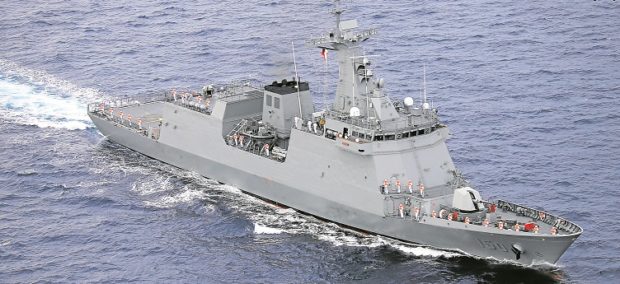MANILA, Philippines — Barely a year after being named commander of the military’s Western Command (Wescom), Vice Adm. Ramil Roberto Enriquez said units under his command were ready to secure new facilities planned in the West Philippine Sea (WPS).
In a radio interview on Sunday, Enriquez bared plans to give fuel subsidies to fishermen as well as build more sheltered ports and cold storage facilities in key areas in the WPS.
The vice admiral said the Philippine National Police Maritime Group had joined Wescom, the Philippine Coast Guard (PCG) and the Bureau of Fisheries and Aquatic Resources (BFAR) in patrolling the WPS, particularly Pag-asa Island.
The PCG deploys BRP Cabra (MRRV-4409) and the BFAR sends two more ships to the area.
He noted that most of the fishermen who ventured to the WPS were actually commercial, and not municipal fishermen and did not come from nearby Palawan but from Navotas in Metro Manila, Mindoro, Bohol, and Cebu.
“They make up 80 to 90 percent of Filipino fishermen at the West Philippine Sea,” he said, citing a survey earlier conducted by the Wescom, the BFAR, and the PCG.
High cost of fuel
“They come from distant places so in the aspect of profit, they would choose not to go if they are not assured of earnings,” Enriquez pointed out.
“There may be lots of fish [in the WPS], but fishermen hesitate because of the high cost of fuel, which will eat into their projected profit,” he explained.
“So BFAR is looking to provide fuel subsidy to encourage our fishermen to fish at the West Philippine Sea,” the vice admiral said.
Enriquez said the government had already started to build more sheltered ports in the WPS in addition to the one in Kalayaan town in Pag-asa Island.
“But Pag-asa [Island] is just one place and there are many other open areas where vessels are exposed to big waves and gale,” he noted, adding that there are plans to build sheltered ports in other Philippine-held features.
Ice storage
The BFAR, he added, has also begun construction of an ice storage or ice production facility on Pag-asa Island to help fishermen ensure their catch stay fresh.
“Once that’s developed, we can maybe encourage more Filipino fishermen to fish at the West Philippine Sea,” Enriquez said. “We are gradually augmenting government forces at the Kalayaan Island Group.”
Throughout various tours as naval commander, Enriquez had repeatedly stressed the need for increased sovereignty patrols in the WPS.
“These interagency efforts are very essential in the way we address the national concerns in the WPS,” he said last year.
In April, Enriquez again asked the Armed Forces of the Philippines high command to provide the Wescom the capability “to map out Kalayaan Island Group in one sweep.”
